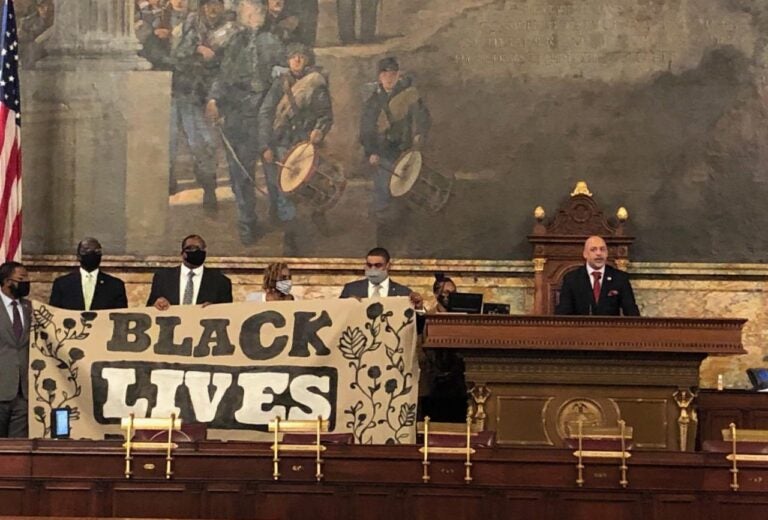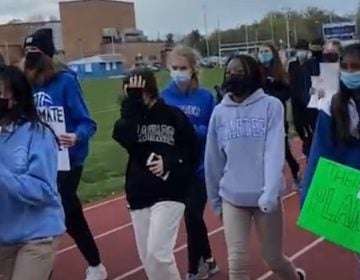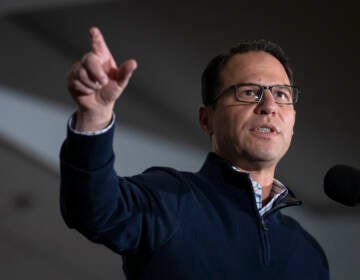After Chauvin verdict, here’s the status of police reform proposals in Pennsylvania
After George Floyd’s death, Dems saw a rare opportunity to pressure the GOP to act on policing reform. Here’s where things stand.
Listen 1:56
Members of the Pennsylvania Legislative Black Caucus took control of the State House in June 2020 to demand action on a suite of police reform bills. (Rep. Jordan A. Harris/Twitter)
Almost a year ago, the police killing of George Floyd created a groundswell that, in Harrisburg, led to a surge of police reform proposals that was unprecedented in recent memory.
Now, with Derek Chauvin’s conviction, state lawmakers are taking stock of how far they’ve come, and how much further they’d still like to go.
“We are relieved,” said State Rep. Jordan Harris (D-Philadelphia). “I am relieved, as a member of the community, that he was found guilty. But no, I’m not celebrating.”
Harris, who as minority whip is the second-highest-ranking Black official in the House, said he doesn’t think the conviction is worth celebrating because crimes like Floyd’s death shouldn’t happen, and if they do, convictions shouldn’t be rare. That, he said, is the guiding principle behind his hopes for policing reform in this legislative session.
“There’s still a lot of work that has to be done,” he said.
After Floyd’s death last summer, as sustained protests erupted around the country, especially in cities like Philadelphia, Harris and other Democrats felt they had a rare opportunity to pressure Republicans who control both chambers of the legislature to act on policing reform.
They capitalized on the momentum, staging a brief takeover of the state House rostrum to unfurl a “Black Lives Matter” banner and call for action on key bills. At the time, State Rep. Chris Rabb (D-Philadelphia) called the atmosphere that summer a “cumulative effect of oppression.”
“Everybody hits a boiling point at some point,” he said.
Two of 19
As the summer protests continued, Harrisburg’s Legislative Black Caucus released a list of 19 priority proposals.
They included significantly limiting the situations in which police can use deadly force, appointing a special prosecutor for cases in which deadly force is used, making police body-camera footage more publicly accessible, updating interrogation protocols, and creating a licensing system for police officers.
There was also a concerted effort to limit the arbitration process that lets police and fire unions bargain to save officers’ jobs. In some cases, the existing process has resulted in firings being reversed, even after outside investigators concluded that a police officer was guilty of misconduct.
Most of the proposals weren’t new for the caucus. They had been repeatedly floated in various forms for years, but had never gotten much traction.
But things felt different in 2020. And though many of the proposals sputtered out, two passed. One was a sweeping measure, largely architected by Rabb, that created a confidential statewide database of police personnel files, which departments could use to screen for past misconduct while hiring.
It had particular resonance in the commonwealth because of the 2018 police killing of East Pittsburgh teenager Antwon Rose Jr. Michael Rosfeld, the officer who killed Rose had previously worked in law enforcement at the University of Pittsburgh, but had resigned under pressure after he was accused of unjustly detaining three men outside a bar.
Rosfeld was acquitted in Rose’s murder. Some, like Rose’s family members, think he never would have been on the East Pittsburgh force if an officer database had existed at the time.
The other measure that became law required officers to get PTSD screenings and trainings on how to spot child abuse, recognize bias, and use force on suspects.
It wasn’t quite the groundbreaking legislation for which some had hoped, acknowledged State Sen. Sharif Street (D-Philadelphia), but “for the General Assembly it was earth-shattering that we did it… it was still really a big deal.”
Keeping up the momentum
Street is the prime Senate sponsor of one of the other key bills Democratic lawmakers hope to pass in this new session: a statewide ban on the use of chokeholds.
Versions have been introduced in both chambers. Street’s take would also require additional use-of-force training for police and create statewide standards.
Last year’s iteration of the bill passed the Senate unanimously, along with a companion measure that dealt with tracking use of force. But both died in the House before the session ended, and must now restart the process from the beginning.
Harris says the other key priority is also a re-introduced measure — this one to make it more difficult for police accused of misconduct to keep their jobs through union arbitration.
“Nobody wants to get rid of police collective bargaining rights,” Harris said. “But we do want to look at discipline, and say that the system that is currently in place … just doesn’t work.”
For Republicans, ‘the conversation is continuing’
Jason Gottesman, a spokesperson for House Republicans, said he couldn’t recall why many Democratic proposals haven’t moved, or why the Senate’s unanimous use-of-force bills never made it out of the Judiciary Committee in the House.
But he maintained that as far as Republicans are concerned, there’s still room to negotiate on policing.
He pointed to a co-sponsorship memo that Rep. Rob Kauffman (R-Franklin), who chairs the House Judiciary Committee, recently introduced. It proposed creating a statewide “Policing Practices Sentinel Team” that would be made up of law enforcement members and community leaders, and charged with “collecting data and background regarding any critical events involving police officer use of force” and recommending changes.
“I think it’s a good example of the fact that even within the House Republican caucus … this conversation has not stopped,” Gottesman said. “We’re continuing to engage lawmakers on both sides of the aisle in this and continue the discussion on the committee level.”
Republicans are also committed to letting police know lawmakers are on their side. For instance, one measure — which has gotten criticism from the American Civil Liberties Union — would increase the penalty for spitting on police, even inadvertently. If the measure succeeds, spitters who are sick could receive up to seven years.
GOP leaders haven’t yet made any promises on Democrats’ priority bills.
Street, for one, says he’s feeling good about the odds that Democrats might be able to get more of them onto Democratic Gov. Tom Wolf’s desk.
“It’s horrible that we had to watch a man’s execution on TV in order for people to really come around,” he said. “But people have come around. And I’m cautiously optimistic.”

Get more Pennsylvania stories that matter
WHYY is your source for fact-based, in-depth journalism and information. As a nonprofit organization, we rely on financial support from readers like you. Please give today.








